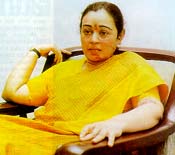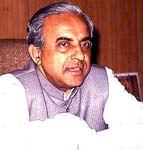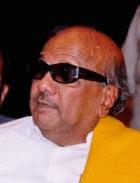The Rediff Interview / V S Chandralekha
'Karunanidhi doesn't have a good track record'
 On October 12, for the first time in the 308-year history
of the Madras corporation, a mayor will be voted to power. The
battle between Tamil Nadu Chief Minister M Karunanidhi's son, M K
Stalin, and the former IAS officer turned politician V S Chandralekha promises to be tough. Also in the fray is a comedian from Tamil films, S S Chandran, of the MDMK.
On October 12, for the first time in the 308-year history
of the Madras corporation, a mayor will be voted to power. The
battle between Tamil Nadu Chief Minister M Karunanidhi's son, M K
Stalin, and the former IAS officer turned politician V S Chandralekha promises to be tough. Also in the fray is a comedian from Tamil films, S S Chandran, of the MDMK.
When Dr Subramanian Swamy, president of the Janata party, appealed for
support for Chandralekha, who heads the party's Tamil Nadu unit, little did he
realise that support
would come from an unexpected quarter. Former state chief minister Jayalalitha Jayaram withdrew her AIADMK party's candidate in Chandralekha's favour.
The decision shocked many Madras residents who have not forgotten the persistence of Dr Swamy
and Chandralekha in bringing to light several misdeeds of the
Jayalalitha regime. Not a day passed without Swamy producing some fresh revelations about Jayalalitha's misdeeds.
And Chandralekha? She is the bureaucrat on whose face acid was flung during Jayalalitha's rule,
scarring her countenance forever. Several months in hospital and after numerous operations,
Chandralekha resigned her job as an IAS officer to
join the Janata party. She has been trying to get
justice ever since. The case is now with the Central Bureau of Investigation.
Ironically, the DMK used the acid incident to win votes in the assembly election.
How could she accept Jayalalitha's support? Chandralekha clarifies her stand in this
interview with Shobha Warrier.
Why did you decide to contest this election? Is it because Karunanidhi's
son Stalin is a candidate for the mayor's post?
Initially, I had no intention to contest the election. It
was decided at the very last moment. When it became clear
that the DMK was going to field Stalin as a candidate. Leaders
of the Congress party, our alliance partner, Kumari Anandan,
Tindivanam Ramamurthy, Krishnaswamy, Maragatham Chandrashekhar
and Vazhappadi Ramamurthy felt this kind of flouting of
all democratic norms should be strictly opposed.
It was their decision that I should be fielded as a candidate because
they felt I have all the necessary qualifications to be a good
mayor.
Is it because you were once an IAS officer?
As an IAS officer, I held various important positions
in the government. As of now the corporation's administration needs
a lot of improvement, and they felt I would be able to provide
a good administration. I was persuaded to be a candidate. It came as a surprise to me.
In Tamil, they call the mayor Nagara Thanthai(father
of the city). Whoever called the mayor so expected only a man to be mayor. As a woman,
do you think you have an advantage over the others?
I have never felt disadvantaged because I am a woman.
In my political life and earlier in my career, I never found
that being a woman was a disadvantage. So it is neither an advantage
nor a disadvantage.
If you win the election, they will have to change the gender.
(laughs) May be Nagara Annaior something like
that. I think I'll get the support from all sections of
society. There is a general feeling among women that the DMK
is anti-women. The DMK had always been unpopular with women. The image
of the party is such that generally women don't feel secure when
the DMK is in power. Therefore, women will certainly support my
candidature.
In the assembly election, the DMK-TMC alliance swept the poll.
Soon we will have corporation elections. How do you assess your chances?
 They swept the assembly election, not because of their
inherent merit or strength. They actually won because of the campaign
done by Dr Swamy and myself. We didn't have an organisation, so
we could not reap the benefits. They harvested what we had sown.
Because they had an organisation. Like in the zamindari system,
what the tenants cultivate the zamindars take away.
They won because people felt disgusted with
corruption. So it was an anti-corruption vote, not a pro-Karunanidhi
or pro- Moopanar vote.
They swept the assembly election, not because of their
inherent merit or strength. They actually won because of the campaign
done by Dr Swamy and myself. We didn't have an organisation, so
we could not reap the benefits. They harvested what we had sown.
Because they had an organisation. Like in the zamindari system,
what the tenants cultivate the zamindars take away.
They won because people felt disgusted with
corruption. So it was an anti-corruption vote, not a pro-Karunanidhi
or pro- Moopanar vote.
Karunanidhi doesn't have a good track
record. In his first term as chief minister he
institutionalised corruption. All corrupt officers were given
important positions and coterie rule was brought into Tamil
Nadu during his time. The various corrupt deals are documented in
the Sarkaria Commission report.
He is not a paragon of virtue. So, it is not that
people thought he would give an excellent rule and voted him to
power. They might have felt a lesser evil should be voted to power.
Now that he is in power, he doesn't show any signs of improving the
state or rooting out corruption. Many corrupt officers
are back in the saddle. It (the anti-corruption move) is only being
used as a political strategy to threaten the AIADMK, break the
party so that it will pave the way for his son's rule in the future.
 The main Opposition party is the AIADMK, so if the AIADMK is
weakened he feels it is advantageous not to his party,
but to his son whom he wants to succeed him in future. That is
what he is doing now. I am not holding a brief for AIADMK, please.
All that I am saying is that he is going slow in all the cases.
Though he is in power, he is doing nothing about it.
The main Opposition party is the AIADMK, so if the AIADMK is
weakened he feels it is advantageous not to his party,
but to his son whom he wants to succeed him in future. That is
what he is doing now. I am not holding a brief for AIADMK, please.
All that I am saying is that he is going slow in all the cases.
Though he is in power, he is doing nothing about it.
Take my own
case. Four months have passed. The confessional statement of Surla
(the man who is alleged to have thrown acid at her)was in the hands of the police. There was no stay from the Supreme
Court as far as the trial was concerned but the government did
not move one foot in the case. All they want to know was the
advantage they can get from all the cases.
In your manifesto, you have promised to check corruption. As
a mayor, how much can you do?
Corruption is built into the system, so you have to attack
the system if you really want to root out corruption. There is
so much of corruption everywhere because there is too much of
government control. Now you take the case of the corporation,
you have building rules and various other rules which are so complex
that the official who is implementing them can manipulate them
the way he wants. The moment you get a chance to manipulate, corruption
is going to creep in. So, what you have
to do is, simplify the rules so that the common man will understand
them. That is one way, may be the only way, you can root out corruption.
Also involve neighborhood groups in the activities of the corporation
so that people's participation is there. They can take up issues
when something wrong happens. When the official knows that people
are watching his moves, it will definitely check him from being
corrupt.
Chandralekha's Photographs: R Kannan
|





 On October 12, for the first time in the 308-year history
of the Madras corporation, a mayor will be voted to power. The
battle between Tamil Nadu Chief Minister M Karunanidhi's son, M K
Stalin, and the former IAS officer turned politician V S Chandralekha promises to be tough. Also in the fray is a comedian from Tamil films, S S Chandran, of the MDMK.
On October 12, for the first time in the 308-year history
of the Madras corporation, a mayor will be voted to power. The
battle between Tamil Nadu Chief Minister M Karunanidhi's son, M K
Stalin, and the former IAS officer turned politician V S Chandralekha promises to be tough. Also in the fray is a comedian from Tamil films, S S Chandran, of the MDMK.
 They swept the assembly election, not because of their
inherent merit or strength. They actually won because of the campaign
done by Dr Swamy and myself. We didn't have an organisation, so
we could not reap the benefits. They harvested what we had sown.
Because they had an organisation. Like in the zamindari system,
what the tenants cultivate the zamindars take away.
They won because people felt disgusted with
corruption. So it was an anti-corruption vote, not a pro-Karunanidhi
or pro- Moopanar vote.
They swept the assembly election, not because of their
inherent merit or strength. They actually won because of the campaign
done by Dr Swamy and myself. We didn't have an organisation, so
we could not reap the benefits. They harvested what we had sown.
Because they had an organisation. Like in the zamindari system,
what the tenants cultivate the zamindars take away.
They won because people felt disgusted with
corruption. So it was an anti-corruption vote, not a pro-Karunanidhi
or pro- Moopanar vote.
 The main Opposition party is the AIADMK, so if the AIADMK is
weakened he feels it is advantageous not to his party,
but to his son whom he wants to succeed him in future. That is
what he is doing now. I am not holding a brief for AIADMK, please.
All that I am saying is that he is going slow in all the cases.
Though he is in power, he is doing nothing about it.
The main Opposition party is the AIADMK, so if the AIADMK is
weakened he feels it is advantageous not to his party,
but to his son whom he wants to succeed him in future. That is
what he is doing now. I am not holding a brief for AIADMK, please.
All that I am saying is that he is going slow in all the cases.
Though he is in power, he is doing nothing about it.